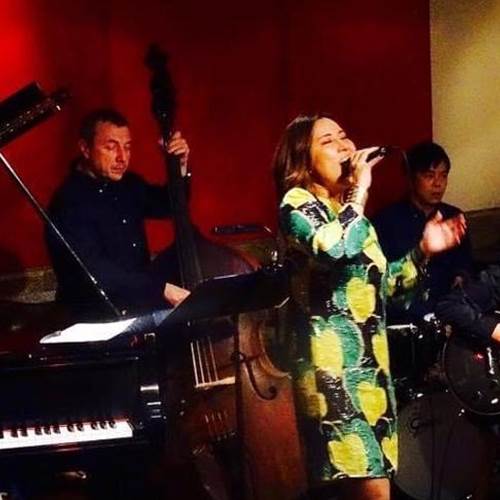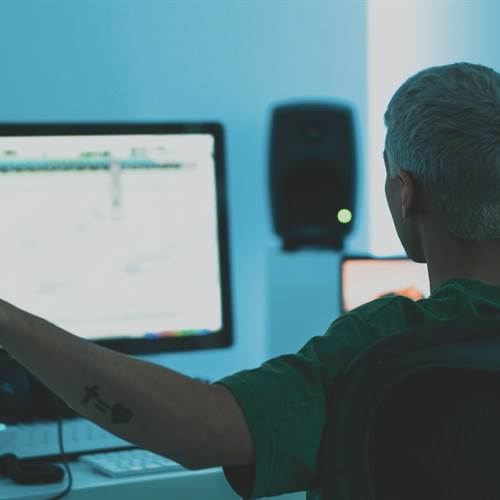
An In-Depth Guide on Touring: Kassie Carlson & Guerilla Toss
Posted Saturday, April 20th 2024 by Andy King
In this extensive interview, Kassie Carlson, lead singer of the American rock band Guerilla Toss, discusses the ins and outs of touring and highlights important details to consider for bands when planning a tour.
Kassie Carlson is the lead singer of Guerilla Toss, an art-rock band signed with Sub Pop Records, based out of upstate New York. They were listed in Rolling Stone magazine as one of the “10 Great Modern Punk Bands.” Guerilla Toss has been together for over 10 years and in that time has performed countless shows, recorded 6 full-length albums and 8 EPs, including several music videos, and toured the country in various capacities. Kassie was kind enough to give Andy an inside look into what life is like on the road as a musician!
So, let’s start at the beginning of the journey…
How far in advance do you start planning a tour?
Long tours are usually planned 6-9 months in advance.
How do you choose your tour route?
The tour route is based on a lot of things. We try not to have drives that are 8 hours plus without a day in between. It's really important to get enough sleep on tour and take care of your body. It's hard to do that if you go to bed really late, wake up really early and then are stuck in the car all day. It's not good for the psyche, body or the music.
We try to book dates that make sense consecutively. We wouldn't want to be backtracking or going too far out of the way for anything.
We have a support tour coming up and decided to book a few dates on the way back like Chicago and Minneapolis after the support tour because we know we can make money and have a good crowd as the headliner in those places. Also tours should be hashed out with a budget beforehand. If you're going to lose a lot of money before you leave, it's ok to say no, you can't make it work. Never feel forced to work as an artist without fair pay.
How do you choose venues?
We usually choose the venues based on availability, sound system, past artist hospitality, personal perception of coolness, and of course what makes sense in terms of our draw. The draw could be different in different cities too! Some scenes are smaller or larger based on the type of music you're performing. Sometimes it's better to book a room on the smaller side and fill it, rather than a huge room and have it feel empty.
On performing with other bands…
How is a show lineup decided?
A show lineup is usually decided by how well the music gels with the other bands, and also how well the bands draw. No one in the equation wants to lose money. Promoters will often look at spotify followers, past ticket sales at other venues, who else your band or project has opened for, etc.
What's it like to support or open for a band and how does that work?
When you do support for a bigger band it's awesome. You get a taste of the big time! Chances are however you will have a shorter set, and less people will be there for your set, but try to take it all in positively. This is an opportunity to learn from others and have experiences you might not have had otherwise. Ask questions. Listen and learn.
All about the money…
How is a tour funded?
1. Guarantees: Pre-decided agreements between you and the venue before you get to the venue about how much you're going to make. This could be a set rate, a bar cut, or another type of deal. Make sure you get everything in writing.
2. Merchandise: Make as much merch as possible within reason. It's the best way to make money. T-shirts, buttons, CDs, vinyl, cassettes, posters, but it doesn't stop there! The possibilities are endless. Let your creativity flow!
3. Savings: If you make extra money on a tour, don't spend it unnecessarily. Save it!
4.Tour Support: Some bands get tour support from their labels, but even that is very rare these days. Plus it's technically a loan that bands have to pay back.
Is any press involved?
Sometimes we hire a publicist for a release, but it can be very expensive. Writing your own press release can work better than you'd imagine. Social media advertising and organic outreach without spending money is good too. When you're out on the road, try to be outgoing and remember people's names. Thank them for booking the show, doing the door, bartending, thank everybody, be respectful and they will remember you and probably ask you back.
The equipment haul…
What equipment do you take with you and what do venues provide?
I started using in-ear monitors a few years ago and it has totally changed my life for the better. The switch came when I started to write more melodic music opposed to purely punk material. The worst thing about being in a rock band is it's too damn loud! Just kidding... but you don't want to push your voice to the limit night after night. I have sound person trust issues. There are many instances where the monitors are slightly broken, or the venue is reflecting sound in a really weird way, or the sound person just isn't great at mixing. On tour, until you get to the really big venues, you don't really know what you're going to get.
So here's what I do... I have a pedal board with four things on it:
1. Shure PSM 900
Professional in-ear personal monitoring system with an antenna and a radio pack with IEM headphones. The pack clips on my belt so I have only my voice coming directly into my ears. Sound people will get freaked out at smaller venues if you mention you have in ear monitors, you can say "no, it's just for my voice". The personal monitoring system stays with me on my pedal board so no one is messing with it but me. I have a photo of my dog on it to maintain positivity.
2. Rechargeable Battery stand for the battery pack
I would rather have the rechargeable batteries to save money and they last a long time.
3. Strymon Timeline Delay Pedal with Expression Pedal
I like a little delay on my voice. I like this pedal because it sounds good and there are different settings you can save to the expression pedal that have different results. For instance, if I press the A button on the Strymon Timeline Delay, the expression pedal affects the amount of delay on the voice. The B switch I have set to time stretch so if I want to get weird and theatrical on a song and have the delay bending and warping via the expression pedal.
Note: The IEMs play an important role here. The vocals are not in the front monitor wedge because I have them in my headphones. This ensures there is never any feedback when you play with effects.
4. Eventide H90 + Eventide Mixlink
Incredibly versatile pedal with all kinds of fun things. The mixing link pedal is an amazing preamplifier with phantom power, tons of gain for low-output mics, and ultra-low noise performance. It has an effects loop that accepts balanced and unbalanced signals, so you can add studio effects or guitar stompboxes to enhance your sound. The Mixing Link is a smart way to integrate effects into your vocal chain.
All of these items are velcroed to the pedal board and all I have to do is plug it in. I have a big yellow Pelican flight case that everything fits into with foam so that it is safe. I have decorated it generously with fun stickers.
Pedals I have had before that are also great for Vocals:
1. TC Helicon Voicelive
Notable Functions:Autotune Capabilities, Reverb, Doubling and Tripling, Harmonies, Ability to save settings
2. BOSS VE 20
Notable Functions: Reverb, Chorus, Distortion, Doubling and Tripling, Harmonies, Ability to save settings
Things venues have for me: PA System and Monitors, some sort of backline like a drum kit or guitar amps (but possibly quite beat up), sometimes a projector for visuals
On the physical and mental…
How do you maintain health on the road?
1. Drink Lots of Water
I drink A LOT of water on the road (not much while I'm actually in the car because that would require way too many pit stops) Water is the best thing for your voice. You should be chugging water from the moment you get to the venue for the sound check until 45 minutes before your set. Your brain and your voice need water.
2. Eat Tons of Vegetables
Don't be afraid to stop at Whole Foods or another grocery store on tour, your body will thank you!
3. Make sure you sleep well!
4. Find Time for Yourself Away from the Group
Be sure to meditate, enjoy yourself in your free time, connect with loved ones, laugh a lot, and read a lot!
Pre-show ritual?
Usually before the set I will do a quick walk around the neighborhood and stretch out everything. I move my arms, my legs, my back, my fingers, legs... toes. I stretch my tongue, entire jaw, everything. I jump around, skip, make funny noises... everything possible to be ok in my body before I sing. As I walk I do a breathing body scan. I used my breath to massage the inside of my skull, my arms, legs, shoulders as if it were a wave moving across the shore. I've found this method very helpful for anxiety and also sleep.
I also try not to talk too much before the show as social situations can be draining for me. It is easier for me to hold a conversation after the show when the performance has passed and you are energized from a live show.
Have you ever had to cancel a performance?
Yes, for Covid reasons and the van breaking down. It's pretty rare we cancel though.
The non-performing aspects of tour…
How do you maintain and deal with relationships with your band while being in such close quarters?
It's very important to find time for yourself and bring along activities for yourself so you don't end up scrolling on your phone all day. touring can be an exciting time to figure out that new skill you have been putting off because you haven't had the time... like learning a new language, picking up a new book, or taking up knitting. Taking care of your physical and mental wellbeing will provide you the best skills to deal with any difficult relationships.
What do you do on the road besides perform?
I like to read books or type ideas I have for the future on my computer. I also draw and doodle. If I am in a new town I will walk around for hours just checking things out, listening to music and taking in all in. I really like looking at stuff and it provides great material for lyric writing.
Your least favorite part of being on tour?
- When a sound person thinks I know nothing about sound because I am a female
- When venues don't have a greenroom that's isolated from the show
- When venues don't provide non-alcoholic beverages
- A sketchy hotel
- The van breaking down
- Forgetting to eat or drink water
- Grumpy sound person that can't be reasoned with or made to laugh
- Broken sound system that can't be fixed
Any unexpected happenings?
One time on tour a tornado landed in the field off the highway. It was chilling. At first the sky went completely yellow, then cold and still. All the cars and trucks on the highway came to a dead stop... and then we saw the finger of the tornado touching down far in the distance. It was so far away, we didn't really have a high degree of wind, but everyone could see it, and the atmospheric shift was one of the most beautiful things I have ever felt in terms of weather. Minutes after it touched down in icy stillness, we were hit with a colossal rainstorm. It was so crazy we had to pull off the exit. It started to hail so I pulled off to a pizza parlor to get everyone fed. While inside lightning struck the building and someone shouted " IT'S HIM!!!" and we all laughed a lot.
Odds and ends…
Anything else you want to share?
Homewood Suites is my favorite hotel chain because it is always clean, there's free breakfast, a workout room and SUITES. Suites are a great hack if you have a bigger crew and you want to maximize comfort. Usually in a suite there are two king beds and a pull out couch plus a full kitchen. Sometimes you can get them with three beds and a pull out couch but that's rare. They also always allow dogs and have a great late night snack store.
Don't be afraid of loyalty points! I have stacked up so many Hilton, and various airline points over the years and they really get you discounts! Last time I flew to Seattle with 5 people it was only $15 for all of us.
Grocery stores with a hot bar are a great stop if you're looking for something for everyone.
On Watley… (The Band Dog)
And most importantly…
I bring my big Chow Chow Watley on tour and it's very fun to see my bandmates looking lovingly at him in the van. He's good for morale. *Andy has had the distinct pleasure of meeting Watley over Zoom and can confirm that Watley is good for morale.*
If you want to check out Kassie, Watley, and Guerilla Toss you can find them on all social media @GuerillaToss and you can also check out their website: https://www.guerillatoss.com/

Andy King
Senior Voice Teacher Associate
Andy specializes in voice technique for Musical Theatre, Pop/Rock/R&B, and Classical. Mr. King’s clients range from professional Music Theatre actors to Professional Pop/Rock/Singer-Songwriters and sacred singers singing professionally in NYC churches and synagogues. He also accompanies and coaches a Musical Theatre class at New York Vocal Coaching. His clients have been seen on Broadway, Off-Broadway, on National Tours, and Regional Theaters.

NYVC Singer Spotlight: Erika Matsuo
NYVC's Kacey Velazquez had the honor of speaking with New York-based, Japanese jazz vocalist Erika Matsuo about her artistic journey...

NYVC Artist Spotlight: ISY
Hey, ISY! Tell us a little about yourself!

Yes, They Work! The Advantages of Online Voice Lessons
Tackling some listener questions, Andy and Matt give tips and exercises on building strength in the voice! They also reflect on how to prevent vocal fatigue and maintain singing health.